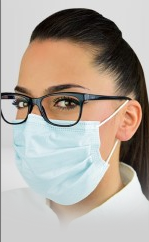 |
Lion's Dental Supply & Equipment
|
|
|
|
|
 |
|
|
|
|
Omega ASTM Level 2 Light Blue Surgical Face Masks |
|
|
Omega ASTM Level 2 Light Blue Surgical Face Masks
Inner material feels silky soft on your skin, along with gentle ear loops and a curved nosepiece for a pleasant fit. Hypoallergenic. 3 Ply, Pleated. Latex and fiberglass Free, Soft, lightweight, and highly breathable facial mask. Cellulose-blend inner layer is extra-soft and dye-free. Light Blue color. Omega Disposable Surgical Masks are More breathable and Softer than leading competitors. Light, comfortable mask for extended wear. Three-ply, soft, nonirritating inner and outer facing. High-filtration efficiency with 3 layers of protection Helps to block exhaled droplets.
Omega ASTM Level 2 Medical Grade
Face Masks with Fluid Protection. Omega Procedure Masks are manufactured in an ISO compliant facility by a manufacturer that is approved by the FDA to produce medical supplies of all forms-not just masks. These masks have undergone rigorous testing to ensure regulatory compliance and more importantly to ensure a premium mask you can trust.
Omega Disposable Face Masks have been tested by the 3rd Party Medical Device Labs. Nelson Labs is a laboratory accredited to assess "Masks, Gloves, Medical Protective Clothing and Other Personal Protective Equipment." These test reports from these labs are also accepted by the US FDA. these test results include over 98% bacterial filtration efficiency and meet the EN14683 Type IIR EU Standard requirements.
Brand: Omega
Color: Light Blue
Composition/Ingredients: Hypoallergenic
Fluid Resistant: ASTM Level 2
Item Type: Earloop
Quantity: 50/Box
Bacterial Filtration Efficiency: >98.6
Particulate Filtration Efficiency: >98.2
Flame Spread: Class 1
Differential Pressure: >5.0
Meets ASTM Level 2 standard, 120 mmHg
Packaging: Since the Corona Virus They are now Packed in a Plactic Bag Inside the Box to prevent Cross Contamination from Manufacturing
Reg $ 29.99 $ 17.99 |
Dental professionals require different levels of protection when working with high-risk versus low-risk patients & procedures. Lions Dental carries earloop masks from leading manufacturers such as Cranberry, Crosstex, Ecobee, Halyard, and Medicom, as well as our own House Medical Brand, to help ensure effective infection control during all kinds of dental procedures. Make Lions Dental And Medical Supply your one-stop resource for Disposable face masks that support safe and infection-free delivery of oral health care.
Earloop Face Masks
Lions Dental and Medical Supply offers a variety of earloop masks to meet ASTM Level 1, 2, and 3 infection control standards. Lightweight and hypoallergenic offerings, many with adjustable nosepieces, deliver optimal comfort for extended wear, while anti-fog options enhance visibility. Fluid resistant materials and aluminum chin pieces for tighter fit protect against spray, splatter, and airborne particles. Rely on Us for earloop masks that provide the right level of protection at competitive prices — all backed by the Lions Dental guarantee of quality, convenience, and overall satisfaction. |
Surgical Face Masks (Face Masks)
A surgical mask is a loose-fitting, disposable device that creates a physical barrier between the mouth and nose of the wearer and potential contaminants in the immediate environment. Surgical masks are regulated under 21 CFR 878.4040. Surgical masks are not to be shared and may be labeled as surgical, isolation, dental, or medical procedure masks. They may come with or without a face shield. These are often referred to as face masks, although not all face masks are regulated as surgical masks.
Surgical masks are made in different thicknesses and with different ability to protect you from contact with liquids. These properties may also affect how easily you can breathe through the face mask and how well the surgical mask protects you.
If worn properly, a surgical mask is meant to help block large-particle droplets, splashes, sprays, or splatter that may contain germs (viruses and bacteria), keeping it from reaching your mouth and nose. Surgical masks may also help reduce exposure of your saliva and respiratory secretions to others.
While a surgical mask may be effective in blocking splashes and large-particle droplets, a face mask, by design, does not filter or block very small particles in the air that may be transmitted by coughs, sneezes, or certain medical procedures. Surgical masks also do not provide complete protection from germs and other contaminants because of the loose fit between the surface of the face mask and your face.
Surgical masks are not intended to be used more than once. If your mask is damaged or soiled, or if breathing through the mask becomes difficult, you should remove the face mask, discard it safely, and replace it with a new one. To safely discard your mask, place it in a plastic bag and put it in the trash. Wash your hands after handling the used mask. |
Copyright © 2013 Web Design by Web.com Group, Inc. |
|
|
 |
 |
|
 |
|

